- Home
- Peter F. Hamilton
Misspent Youth
Misspent Youth Read online
CONTENTS
TITLE PAGE
ACKNOWLEDGMENTS
1. MAGIC MEMORIES
2. BEYOND AVARICE
3. PARTY ON DOWN
4. MORNING AFTER
5. AN INSPECTOR CALLS
6. THE RESTORATION PROJECT
7. AUNTIE
8. DREAM ON
9. GENES AND CIRCUSES
10. IN HOUSE PARTY
11. HERE IS THE NEWS
12. HARD DAY AT THE OFFICE
13. BOY’S EYE VIEW
14. GIRL’S EYE VIEW
15. HIGH FINANCE
16. TWILIGHT HOUSE
17. LINE ’EM UP
18. LATE HONEYMOON
19. CROWDED BREAKFAST
20. AWAY DAY
21. HOME NOT QUITE ALONE
22. MESSING ABOUT ON THE WATER
23. CARDINAL PUFF FOR THE THIRD TIME
24. CELEBRITY STATUS
25. FEEL THE BURN
26. END OF A BEAUTIFUL ARRANGEMENT
27. FLAKY TRACY AND THE BIG LIE
28. EXAM PRESSURE
29. TIM IN LOVE
30. WILL THE REAL JEFF BAKER PLEASE STAND UP
31. AFTERMATH
32. SECOND TIME AROUND
33. AGONY AUNT
34. HAPPY BIRTHDAY
35. THE LAST FAREWELL BARBEQUE
36. BIG CITY BLUES
37. A SNOWFLAKE IN HELL
38. THE JOY OF KNOWING
39. HOME COMFORTS
40. GLOBAL COMMUNICATIONS
41. SEMIBALLISTIC
42. TROUBLE…
43. DECISIONS, DECISIONS
44. BACK HOME
45. FIRST CONTACT
46. OPPOSITES
47. LIFE GOES ON
48. ….ALWAYS COMES…
49. TALKING ABOUT A REVOLUTION
50. FREE SPEECH
51. COMMITMENT
52. AN EVENING IN
53. ALIEN HOME GROUND
54. …IN THREES
55. STEALTH ECONOMY
56. CITY OF STONE AND MADRIGALS
57. THE WATCHERS
58. DYING LIVE
ABOUT THE AUTHOR
ALSO BY PETER F. HAMILTON
COPYRIGHT
Acknowledgments
Between publication of the U.K. and U.S. editions of Misspent Youth I was asked by my American editor to make a few changes to the text. While doing so I took the opportunity to make some larger revisions, resulting in a manuscript that is noticeably different from the original. However, I would like to assure readers that it is exactly the same story.
I am indebted to Kate, Chris, Graham, Peter, Colin, and Ant, who took the time and trouble to comment on the first version. And to Betsy, who took it one step further.
PETER F. HAMILTON
Rutland, U.K.
April 2008
THERE WAS A PARTICULAR DAY that Timothy Baker always remembered whenever he thought back to his childhood: the air tattoo at RAF Cottesmore when he was six years old. It was one of the rare events his parents attended together, which to his young mind made a perfect, happy family outing.
The EuroAir Defence Force had assigned a good number of both combat and transport aircraft to the open day, always eager to show the bolshie English how worthwhile and relevant the unified European squadrons were. It was also well attended by international aerospace companies, as well as senior air staff from more than thirty foreign air forces. Elaborate company pavilions lined half the taxiway, their tiered seating giving patrons and customers an excellent view of the flying exhibition, while static displays of combat aircraft, transports, tankers, radar cars, and missile batteries stretched along the entire three kilometers of the parking lot.
Over ninety thousand people were expected during the weekend, stretching Rutland’s rural transport infrastructure to the limit. By midmorning on Saturday Timothy was convinced that most of them had turned up already; he’d never seen so many people in one place before. He walked along between his parents, sometimes managing to hold hands with both of them at once as they roamed around the husky, lethal hardware. It was a typical late-August day, the incendiary sun glaring down out of a cloudless turquoise sky. The GM tuber grass was still green, if somewhat dry and wiry, after seven straight weeks without rain.
The Baker family walked the entire length of the lot in the morning, with Timothy and Jeff, his father, stopping to admire most of the aircraft along the way. Sue, his mother, tagged along gamely as her two enthusiastic boys quizzed the smiling, polite aircrews for facts and squadron stickers. Timothy managed to plead and entreat his way into the cockpits of several helicopters.
They reached the end of the hot parking lot and began the long walk back, this time through the circus of commercial stalls and mobile shops that had set up camp behind the aircraft. Timothy had spotted several ice cream vans and doughnut sellers earlier, and was already putting his case for visiting several of them to his tolerant yet unmoved parents.
A middle-aged couple walked past, the squat man glancing at the Bakers longer than was strictly polite.
“Now that,” the man said emphatically, “is a Viagra kid if ever I saw one.” His voice trailed off into a dirty chuckle. His wife gave him a sharp nudge.
Timothy twisted around to look at him, but the couple was already vanishing into the crowd. He wasn’t quite sure what a Viagra kid was, although he’d heard the phrase a few times now. It was always used in a mocking way. And he was fairly sure it was something to do with his parents. When he looked up at them for reassurance, his mother was looking straight ahead with her blank smile beaming bright; his father was frowning faintly. Timothy knew his mother was utterly beautiful. When she was younger, she had appeared on datasphere ads helping to sell perfume and clothes, and her looks hadn’t faded; after all, she wasn’t thirty yet. His father, as he was now uncomfortably aware, was older. Timothy wasn’t sure how old exactly, but he had white hair and skin that was wrinkled despite the genoprotein treatments he took every few months.
Jeff caught his son staring up curiously, and smiled. “Let’s go get you that ice cream.”
“Yes please!”
Timothy was given a cash card for a hundred euros, and shot off to the nearest van.
“What’s that?” Sue asked suspiciously when he returned with a triple cone dripping sticky brown and yellow blobs onto his hand.
“Double chocolate chip with banana,” Timothy said cheerfully. “Only fifteen E’s.” He thrust it upward. “Want some?”
“No thank you, dear.”
Timothy couldn’t see his mother’s eyes behind her wide gold-mirror sunglasses, but he knew from her tone that she was disappointed again. It was always so hard to please her. He licked at the cone, delighted by the weird taste mix.
There was a long row of hangars behind the stalls, modern stealth composite bubbles lurking between huge old concrete and corrugated iron structures. The new dark gray hemispheres were sealed against curious eyes, like lead mushrooms bursting out of the grass. They contained the latest EuropeanAerospaceCorporation automated attack fighters, which operated from Cottesmore. In contrast to the secrecy of the new structures, the tall rusty panel doors on the older buildings were wide open. Large banners outside advertised the service companies that had taken over the hangars for the weekend. The Bakers went into the first hangar. Few people were inside.
Timothy moved along the company stands. None of them captured his interest. It was all test equipment and maintenance tools. Dull stuff compared to what was outside. Not even the vast array of intricate parts from a dismantled high-speed turbine held his attention for more than a few seconds. Then the stand right at the end made him come to a complete halt.
The company wa
s promoting its fuselage vibration analysis software, but it was using an eternal tap as part of its advertising. Three slender nylon fishing lines had been tied to the iron rafters of the hangar’s gloomy roof high overhead, holding a big old brass tap four meters off the floor. From that, a fat column of water splashed continually into a bowl on a table at the end of the stand. Timothy stared at it in perplexity. The bowl never filled, yet the water splashing into it never stopped. And when he squinted up at the tap he couldn’t see any kind of pipe attached. For a moment he thought the tiny nylon lines might be miniature pipes, but there were only three of them, and they were way too small to feed such a big tap. What he was seeing simply wasn’t possible. It was like some special effect from a cable show.
“Dad!”
Jeff Baker looked up from the pieces of high-speed turbine he was inspecting.
“Dad, how do they do this? Dad!”
“Do what?”
“This!” Timothy pointed urgently at the tap and its impossible flow of water. “How, Dad, how?”
“Oh, that.” Jeff managed to sound completely disinterested. “It’s magic, son. That’s all.”
Timothy pulled an annoyed face. “No it’s not! Do they teleport the water, or something?”
“Teleport!” Jeff shook his head in faint exasperation. “You watch far too much cable, don’t you?”
“No!”
“This is an old hangar; the past is still alive in here. There are lots of pockets of magic left over from olden times, scattered all across the country.” He gestured at the tap. “And this is one of them. Right, dear?”
Sue raised an eyebrow. “I think it’s lunchtime now.”
Jeff was nonplussed by the reply. “Guess we’d better eat, then,” he told Timothy. “What are you having, three puddings?”
“Yeah!”
“No!” Sue said quickly. “Honestly, you’re worse than he is.”
Jeff pulled a face behind her back. Timothy giggled. He couldn’t resist one last look at the magic tap as they walked back out into the scorching sunlight.
The Bakers headed for one of the biggest pavilions lining the taxiway. They weren’t on the admission list, but Jeff was insistent with the uniformed steward at the gate. Timothy waited impatiently while a senior company official was summoned from the pavilion; aircraft were taking off from the runway, and the pavilion blocked his view. When he arrived, the official was effusive in his greeting. The company would be greatly honored to have the Bakers lunch with them, he said with a wide, eager smile.
Timothy and his parents wound up eating with two members of the board in a glassed-off enclosure at the end of the pavilion. Their table gave him a grand view out across the airfield, and if he did miss any of the exciting aircraft flashing past, a private TV feed to a pair of three-meter screens allowed him to see the planes twisting and diving at all times. It was great. His mother even let him have more ice cream for dessert, with strawberries.
A lot of visitors stopped by their table, corporate executives from across Europe, all of whom were eagerly introduced to Jeff Baker by the ever-smiling board members. Timothy didn’t pay much attention to the adults; he was captivated by the sleek flying cruciforms, which were the newly declassified AiF-080 USAF pilotless interceptors. The machines were less than half the size of the old Hurricanes flown by the European Silver Sky display team, and a lot more nimble.
Timothy asked to be excused while his parents were enjoying coffee and liqueurs. It was very boring in the dining room, although in truth he couldn’t stop thinking about that strange tap. The aircraft were only temporary distractions. He was overwhelmed by the idea that magic could still exist. Such a revelation meant that anything was possible. Anything!
His mother checked that he was wearing his tracker bracelet and let him down from the table. “You’re not to go more than two hundred meters,” she warned as he sped away.
As soon as he was outside, Timothy headed straight for the hangar—it was only a little more than two hundred meters, after all. Well…sort of.
The tap was still there. He stood in front of it, his head cocked to one side as he followed the stream of falling water, his brow furrowed in puzzlement. It couldn’t be real. Yet here it was, happening right in front of him.
“It always looks good, doesn’t it?”
Timothy glanced around. One of the saleswomen behind the stall was smiling at him. “Yes,” he said, then, suddenly bold, he asked: “How did you know the magic was here?”
“Magic?” Her smile widened. “I would have thought a clever boy like you could have worked this out by now.”
“How? I don’t know any spells.”
The woman laughed. “Spells? Well I don’t know about that. We just put a little fountain pump below the bowl, and squirt a jet up into the tap. Takes an age to set it up just right.”
Timothy stared resentfully at the treacherous fountain. He couldn’t even look at the woman; she must think him the stupidest boy on the planet. Embarrassment gave way to anger and sadness as he slunk away. His father had lied to him. Lied! There wasn’t any magic in the world; there never had been.
HAVING A FAMOUS FATHER is a difficult concept for any child to understand. After all, he is just your father, nothing else, nothing exceptional. Tim was almost ten before he finally grasped that his dad was a little different from everyone else’s dad; that people were interested in the old man, what he was doing, what he said, and most important, what he was thinking about. And not just the villagers in Empingham, where they lived, but people on a lot of sites in the datasphere. In fact, when Tim, age nine, typed JEFF BAKER into a findbot, he was rather surprised when it came back listing two hundred and thirty-eight thousand primary references.
According to the first eight entries, all university libraries, Jeff Baker had designed the molecular structure of solid state crystal memories, the ultimate electronic storage mechanism. It was the single most important component around which the entire datasphere now revolved. All human information was stored in the one specific type of lattice that his dad had worked out. His dad. The man who wouldn’t let him have a puppy, and who was hopeless at playing football with him. His dad! The datasphere had to be kidding—like magic, Tim told himself sourly.
But the datasphere didn’t lie. His dad was truly famous. Not that fame was of much practical use in this case. Fame usually came hand in hand with fabulous wealth. The Bakers were very comfortably off, living in a sprawling manor on the edge of the village, with acres and acres of grounds; and Tim went to the nearby Oakham School for a private education; and his grandma was well taken care of in her nursing home. But it wasn’t an own-your-private-Caribbean-island style of wealth.
It could have been, Tim read with growing dismay. That was the bigger part of Jeff Baker’s fame. He could have had a fortune that rivaled that of Bill Gates or Eleanor Pickard. Memory crystals were universal. Without them the entire world would crash to a halt; there would be no information economy—no economy at all, in fact. The tiniest royalty percentage would have given him an income of billions of euros a year from the uncountable numbers of crystals that were grown to feed the voracious global electronics industry.
Instead, in an act of benevolence and philanthropy essentially without parallel, Jeff Baker had refused to patent the crystal structure. Instead he published it on his Web site, and told anyone who was interested to go right ahead and make the crystals. The server crashed for ten days straight due to the millions of attempted hits from across the planet.
Jeff Baker, Tim realized as he read his own family history, didn’t have fame so much as respect. A billion datahead nerds regarded his dad as more important than God. Very nice, but what actual use was it? Tim would have much preferred him to be a cable star. At least that way they would have gotten a constant stream of invitations to glamorous showbiz parties, and he could have mixed with celebrities. That would have done wonders for his kudos at school.
“Is it true?” Tim asked
that suppertime. “Did you invent the datasphere?”
“Not really,” Jeff said with a gentle smile. “But my crystal idea certainly helped it to grow up from being the Internet.”
“Why didn’t you make money from it?”
“I did. I’ve got a whole load of nonexecutive directorships. And my consultancy work pays for your schooling, as well as your mother’s clothes. Just.”
Sue Baker narrowed her eyes to give him a cautionary look over the table.
“It said in the sphere you could have been the richest man in the world,” Tim said.
“Trust me on this, Tim, being the richest man in the world isn’t necessarily a good thing.”
“But…you didn’t get anything out of it. I don’t understand.”
“I got peace of mind. And I got you.” His smile became one of admiration. “You’re more important than money.”
“Thanks. I just don’t think it’s fair, that’s all,” Tim protested. “The whole world depends on your idea. You should be rewarded.”
WHICH IS WHAT DID HAPPEN, but not until eight years later.
AS TEENAGE PARTIES WENT, it was a parent’s standard nightmare. Miranda and David Langley went away for the weekend, leaving their six-bedroom house in the hands of their eighteen-year-old son, Simon, and his elder brother, Derek, who was back from university. As soon as the senior Langleys had left, their sons sent an avtxt to all their friends. Those friends avtxted their friends.
Half of Empingham’s teenagers descended on the quaint stone house for the evening, their numbers bolstered by contingents from surrounding villages and senior boarders from Oakham School, like Zai Reynolds, who managed to get a leave out from their housemaster.
Tim had been going steady with Zai for four weeks, starting a week after his eighteenth birthday party. He was hopeful that tonight, with all the drink available and the hot exuberant party atmosphere, they might be able to move along from groping and heavy kissing to real actual sex. Simon’s house had enough bedrooms; there were bound to be some unused. So he thought before he arrived.

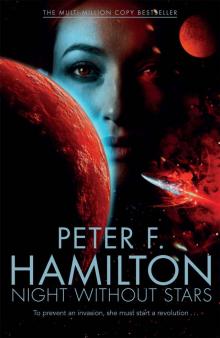 A Night Without Stars
A Night Without Stars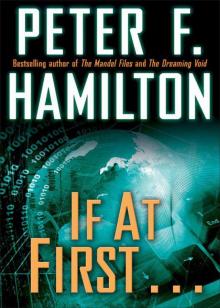 If at First . . .
If at First . . .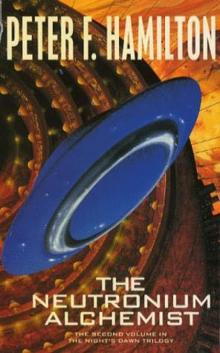 The Neutronium Alchemist
The Neutronium Alchemist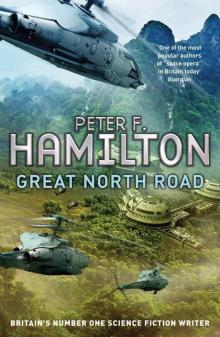 Great North Road
Great North Road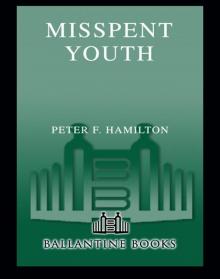 Misspent Youth
Misspent Youth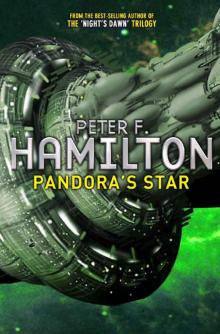 Pandora's Star
Pandora's Star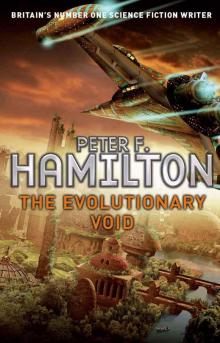 The Evolutionary Void
The Evolutionary Void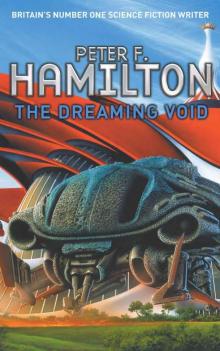 The Dreaming Void
The Dreaming Void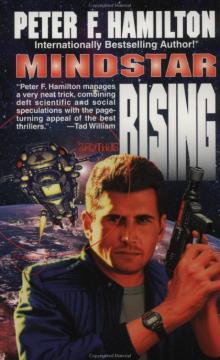 Mindstar Rising
Mindstar Rising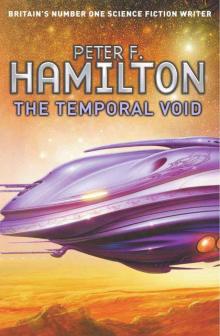 The Temporal Void
The Temporal Void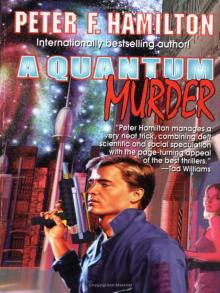 A Quantum Murder
A Quantum Murder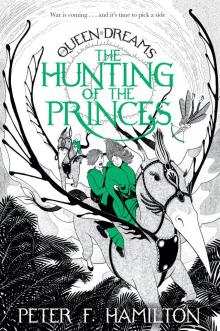 The Hunting of the Princes
The Hunting of the Princes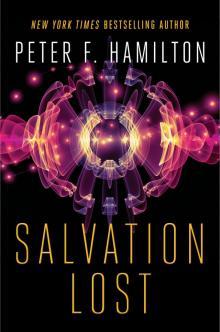 Salvation Lost
Salvation Lost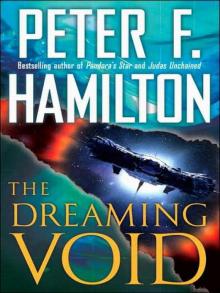 The Dreaming
The Dreaming Salvation
Salvation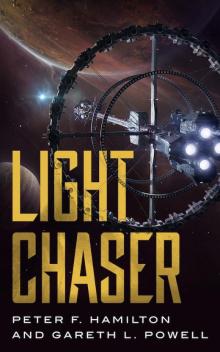 Light Chaser
Light Chaser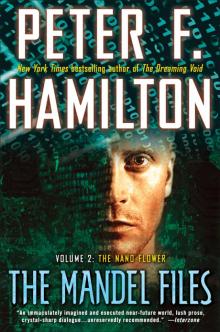 The Mandel Files, Volume 2: The Nano Flower
The Mandel Files, Volume 2: The Nano Flower![The Saints of Salvation [British Ed.] Read online](http://i1.bookreadfree.com/22/the_saints_of_salvation_british_ed__preview.jpg) The Saints of Salvation [British Ed.]
The Saints of Salvation [British Ed.]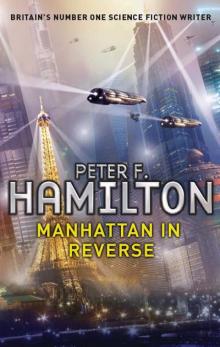 Manhattan in Reverse
Manhattan in Reverse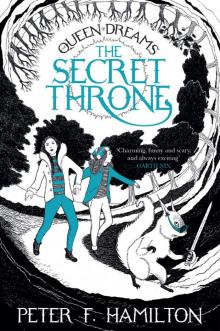 The Secret Throne
The Secret Throne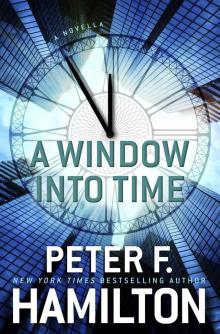 A Window Into Time
A Window Into Time A Second Chance at Eden
A Second Chance at Eden The Nano Flower
The Nano Flower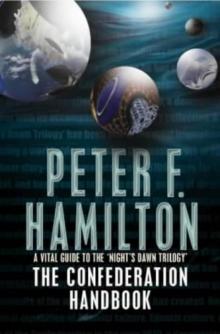 The Confederation Handbook
The Confederation Handbook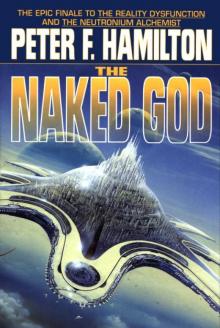 The Naked God
The Naked God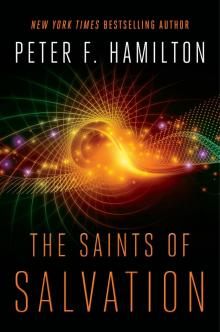 The Saints of Salvation
The Saints of Salvation The Void Trilogy 3-Book Bundle
The Void Trilogy 3-Book Bundle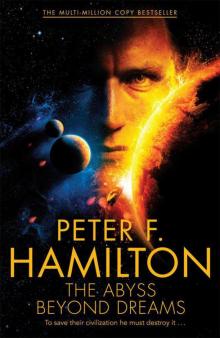 The Abyss Beyond Dreams
The Abyss Beyond Dreams A Voyage Through Air
A Voyage Through Air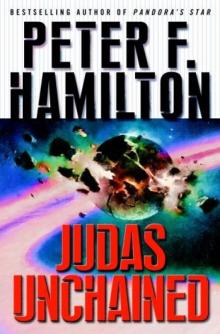 Judas Unchained
Judas Unchained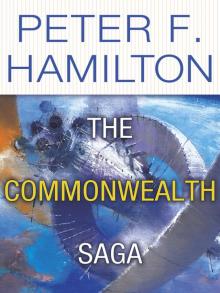 The Commonwealth Saga 2-Book Bundle
The Commonwealth Saga 2-Book Bundle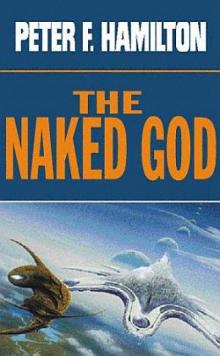 The Naked God - Flight nd-5
The Naked God - Flight nd-5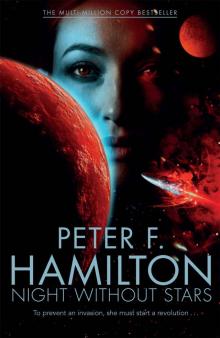 Night Without Stars (Chronicle of the Fallers Book 2)
Night Without Stars (Chronicle of the Fallers Book 2)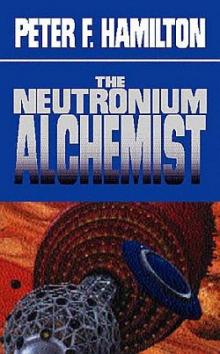 Neutronium Alchemist - Conflict nd-4
Neutronium Alchemist - Conflict nd-4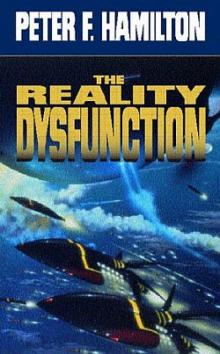 Reality Dysfunction - Expansion nd-2
Reality Dysfunction - Expansion nd-2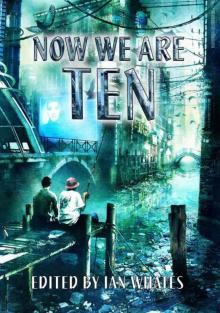 Now We Are Ten: Celebrating the First Ten Years of NewCon Press
Now We Are Ten: Celebrating the First Ten Years of NewCon Press Neutronium Alchemist - Consolidation nd-3
Neutronium Alchemist - Consolidation nd-3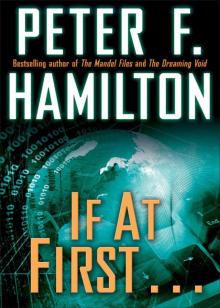 If at First . . . (Short Story)
If at First . . . (Short Story)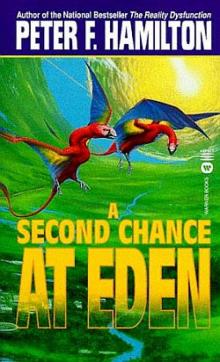 A Second Chance at Eden nd-7
A Second Chance at Eden nd-7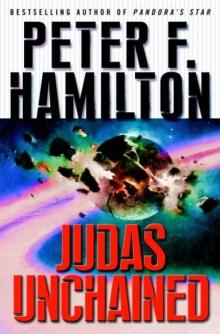 Judas Unchained cs-2
Judas Unchained cs-2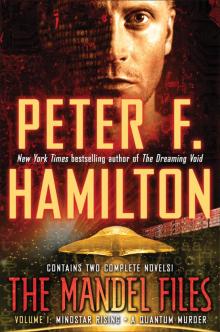 The Mandel Files, Volume 1
The Mandel Files, Volume 1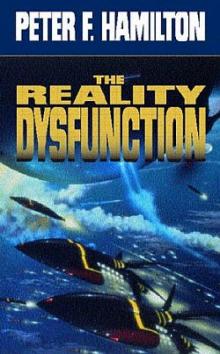 Reality Dysfunction — Emergence nd-1
Reality Dysfunction — Emergence nd-1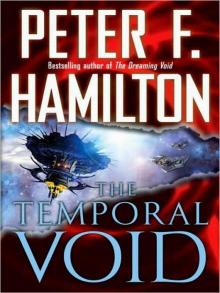 The Temporal Void (ARC)
The Temporal Void (ARC)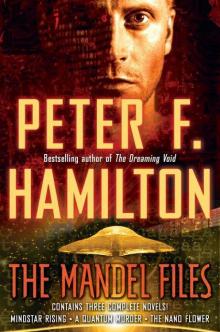 The Mandel Files
The Mandel Files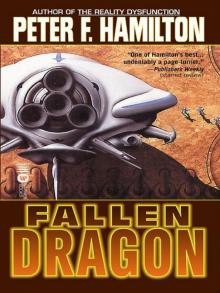 Fallen Fragon
Fallen Fragon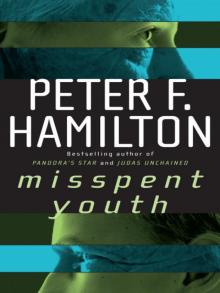 Misspent Youth (commonwealth saga)
Misspent Youth (commonwealth saga)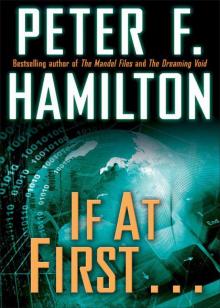 If at First...
If at First...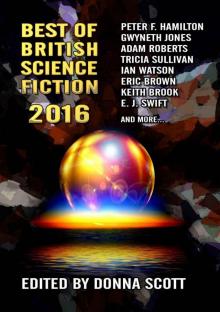 Best of British Science Fiction 2016
Best of British Science Fiction 2016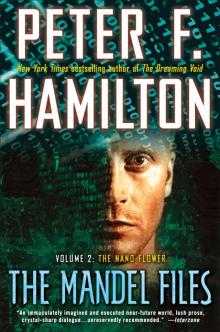 The Mandel Files, Volume 2
The Mandel Files, Volume 2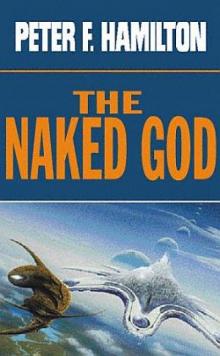 The Naked God - Faith nd-6
The Naked God - Faith nd-6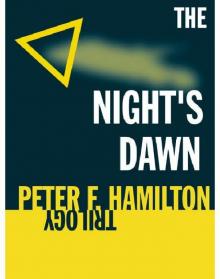 The Night's Dawn Trilogy
The Night's Dawn Trilogy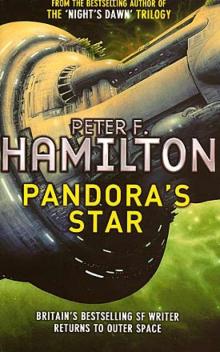 Pandora's Star cs-2
Pandora's Star cs-2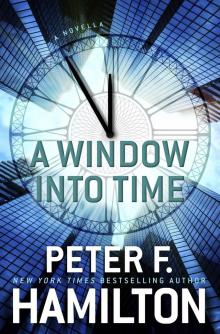 A Window into Time (Novella)
A Window into Time (Novella)